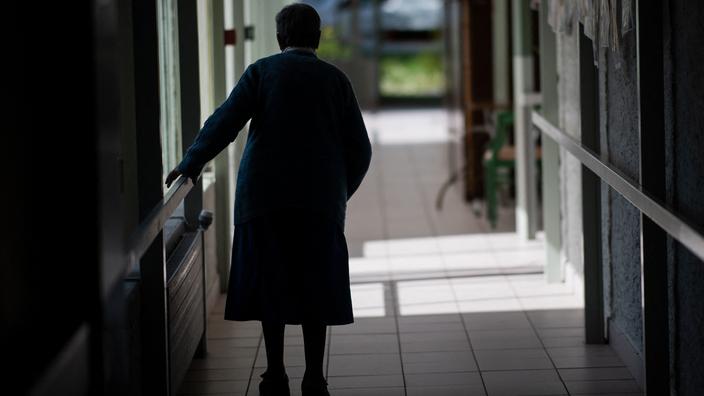The Ministry of Solidarity and Health managed the coronavirus crisis in Accommodation Establishments for the Dependent Elderly (EHPAD), and in particular the visits and outings of residents, with recommendations addressed to EHPAD directions.
The latter might not follow them.
To discover
Michel Houellebecq: "A civilization which legalizes euthanasia loses all rights to respect"
The EHPAD directorates have police powers, a legacy of a 19th century law "
relating to establishments devoted to the insane
", which allows them to decide, on their own, "
specific measures to be taken to ensure physical integrity. and security of the person and to support the exercise of their freedom to come and go
”.
The current law does not provide for a report justifying the measures taken and their duration.
In normal operation, that is to say before the Covid-19 crisis, it was possible to visit your loved one in EHPAD, every day of the week, weekends included, in the morning and after - midday, on a beach from 10 a.m. to 8 p.m., to help him eat, take him out and invite him home.
On June 10, 2021, the 350 members of two associations, spread across France, were questioned about the possible lack of a return to normal in their loved one's EHPAD.
In 77 responses, the recommendations of the Ministry of Solidarity and Health were not respected, i.e. more than 20% of the 350 nursing homes questioned, and by extrapolation over the whole of France between 700 and 1,400 nursing homes.
In these 20% of EHPAD visits could be authorized during the week and prohibited on weekends or only authorized after making appointments recorded in a schedule established each month.
Contamination of a staff member could trigger the re-containment of all residents for 7 days.
The police power was not accompanied by the obligation to publish the reasons which led to the taking of the measures of deprivation of liberty.
Collective forum
These three situations show to what extent the police power of the EHPAD directorates can be used without the conditions set out by law being applied: "
These measures are only provided for in the interest of the people accommodated, if they prove to be strictly necessary, and must not be disproportionate to the risks involved
”.
The police power was not accompanied by the obligation to publish the reasons which led to the taking of the measures of deprivation of liberty. Are the measures always taken in the interest of the residents? Can we, for example, decide that there will not be a weekend visit because there is not enough staff; is it really to protect residents? In the 21st century, this police power which allows certain EHPAD departments to deprive residents of their freedom to come and go seems obsolete, inadequate and without control. Dialogue must exist between EHPAD management, residents, families of residents and staff.
In addition, in its recommendations, the Ministry of Solidarity and Health specifies that the Council for Social Life (CVS) must be consulted by the management before any measure taken concerning the deprivation of liberty to and from residents.
The Ministry of Solidarity and Health must be unaware that there is less than one in fifty CVS that works correctly, and that there are still EHPADs in which the CVS does not exist.
Police power is intended to “ensure the physical integrity” of residents, but the deleterious effects of confinement during the coronavirus crisis have shown that it is also necessary to “ensure the psychological integrity” of residents.
Collective forum
Police power is intended to “ensure the physical integrity” of residents, but the deleterious effects of confinement during the coronavirus crisis have shown that it is also necessary to “ensure the psychological integrity” of residents. The loss of social bond and in particular the family bond and sadness can cause an irreversible slip and sometimes even death.
Where is “the multidisciplinary assessment of the benefits and risks of the measures envisaged” yet provided for in Ordinance No. 2020-232 of March 11, 2020 - art. 39? Can we say that the police power no longer seems appropriate? If so, it should be deleted, or at least amended in order to provide a legal framework for application. A real collegiality of decision-making must exist. The measures must be individualized, reassessed regularly and limited in time. They must be proportional to the goal sought. Seeking the consent of each resident and staff is a requirement. There must be full traceability of decision-making restricting “the freedom to come and go”. This is the guarantee for residents and their families to be able to challenge the decision.There must be a body capable of receiving appeals.
Mr. Patrick Collardot (TouchePasMesVieux association), Mr. Philippe Prince-Demartini (FAVICOVID association), Ms. Véronique Debeaumont (FOR NOS PARENTS association), Ms. Jocelyne Huard de la Marre (Aid'Anés collective), Ms. Julie Grasset (CoeurVide19 collective) , Mrs Olivia Mokiejewski (collective 9471), Mr Jean-Pierre Matteoni (CollectifEhpad13470), Mrs Sabrina Deliry (collective Cercle des Proches Aidants en EHPAD), Mrs Catherine Gonnin (collective EHPAD - union of mobilized families - Alzheimer's and other dependencies), Mr. Dominique Bourgoin (Familles Blois EHPAD collective), Mr. Jean-Louis Genest (Nos Proches collective in EHPAD Franche-Comté), Mrs. Wiana Buisson (REA PROCHE collective), Ms. Joëlle Bertrand (Transparence collective).









